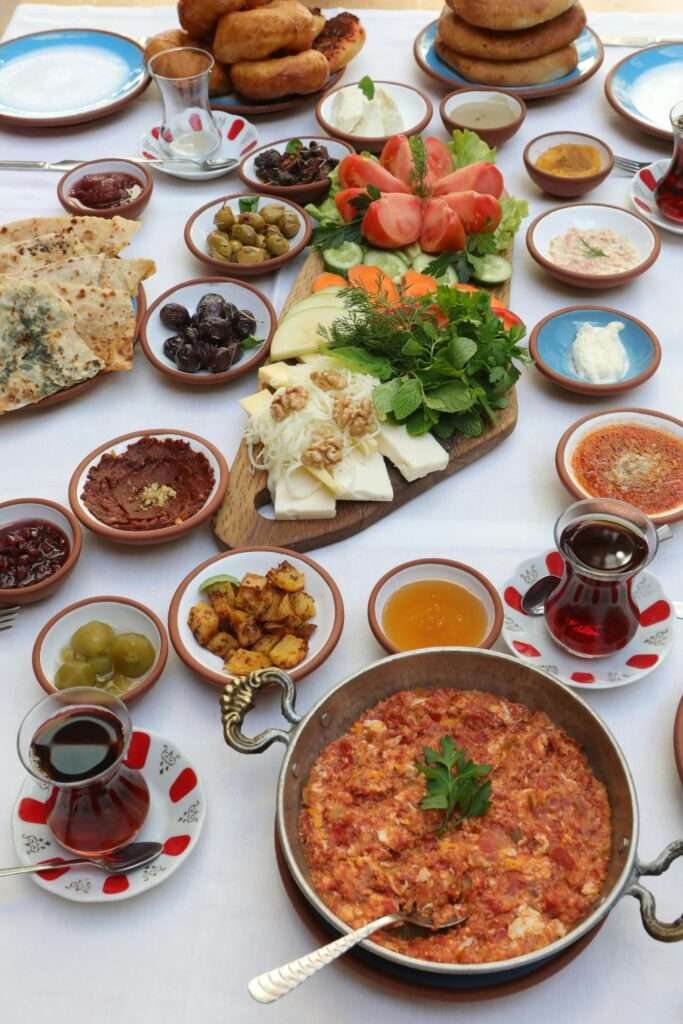A traditional Turkish breakfast isn’t just a meal — it’s a feast, a ritual, and a reflection of Türkiye’s deep-rooted hospitality. With dozens of small dishes covering the table — from olives and cheeses to fresh tomatoes, honey, clotted cream (kaymak), and endless cups of tea — breakfast in Türkiye is slow, social, and satisfying. In this 2025 guide, we’ll explore what makes Turkish breakfast so special, what to expect, and where to try the most authentic versions across the country.
History and Cultural Significance of Turkish Breakfast
The word “kahvaltı” literally translates to “before coffee,” highlighting the importance of starting the day with a hearty and wholesome meal. Turkish breakfast has roots that stretch back centuries, influenced by the Ottoman Empire’s rich culinary heritage and the diverse geography of Turkey, spanning from the Mediterranean coast to the mountainous east.
Traditionally, the breakfast table is a reflection of the Turkish value placed on hospitality and community. It is a time when families gather to enjoy a leisurely meal, sharing stories and strengthening bonds. Unlike the quick, on-the-go breakfasts common in many Western countries, Turkish breakfast is a prolonged, relaxed affair, often lasting several hours.
Core Components of a Traditional Turkish Breakfast
A traditional Turkish breakfast is known for its abundance and variety. The table is usually laden with multiple small dishes, each offering different flavors and textures. Here are the key components:
1. Bread (Ekmek)
Bread is central to the Turkish breakfast. The most common types include:
- Simit: A circular sesame-encrusted bread, crunchy on the outside and soft inside.
- Fresh white bread: Soft, fluffy, and perfect for dipping.
- Bazlama: A traditional flatbread, slightly thicker and soft.
2. Cheese (Peynir)
Cheese varieties are plentiful and diverse in Turkey. Common cheeses served at breakfast include:
- Beyaz Peynir: A salty, white brined cheese similar to feta.
- Kaşar Peyniri: A semi-hard yellow cheese.
- Tulum Peyniri: A strong-flavored cheese aged in goat skins.
3. Olives (Zeytin)
Olives, both black and green, are essential. Often marinated with herbs or lemon, they add a salty and tangy flavor.
4. Tomatoes and Cucumbers (Domates ve Salatalık)
Freshly sliced tomatoes and cucumbers provide a refreshing crunch and balance the saltiness of cheeses and olives.
5. Eggs (Yumurta)
Eggs come in various forms:
- Sahanda Yumurta: Fried eggs, often served with sucuk (Turkish sausage).
- Menemen: Scrambled eggs cooked with tomatoes, green peppers, and spices.
- Boiled eggs: Simply boiled for a light option.
6. Jams and Honey (Reçel ve Bal)
Sweet spreads made from seasonal fruits like apricot, cherry, fig, and strawberry are common. Honey is often drizzled over fresh bread or kaymak (clotted cream).
7. Kaymak (Clotted Cream)
Kaymak is a rich, creamy dairy product similar to clotted cream or mascarpone. It is often paired with honey for a luxurious treat.
8. Butter (Tereyağı)
Fresh, unsalted butter is served to accompany the bread.
9. Turkish Sausages (Sucuk)
A spicy, garlicky cured sausage, sucuk is often fried and served alongside eggs.
10. Vegetables and Herbs
Fresh herbs like parsley, mint, and dill are often included on the table for added freshness.
11. Beverages
- Turkish Tea (Çay): Served in tulip-shaped glasses, black and strong, it is the beverage of choice.
- Turkish Coffee: Occasionally enjoyed after breakfast for its strong and aromatic flavor.
Regional Variations of Turkish Breakfast
While the core components of Turkish breakfast remain consistent, regional differences add unique flavors and specialties to the meal.
Aegean Region
Known for its use of olive oil, the Aegean breakfast features dishes like zeytinyağlılar (vegetables cooked in olive oil), fresh herbs, and varieties of cheese unique to the area.
Black Sea Region
The Black Sea coast adds specialties like hamsi (anchovies), corn bread, and regional cheeses. Tea here is especially strong and served frequently.
Southeastern Anatolia
This region features heartier dishes, often including spicy sausages, various meat dishes, and thicker bread. Çökelek, a type of dried cheese, is also popular.
Central Anatolia
The heart of Turkey offers a balanced breakfast with boiled eggs, fresh vegetables, cheeses, and honey sourced from local bees.
How to Enjoy an Authentic Turkish Breakfast
If you want to experience an authentic Turkish breakfast, here are some tips:
- Take your time: Don’t rush; Turkish breakfast is a social meal meant to be enjoyed slowly.
- Try everything: The joy is in tasting the wide variety of dishes.
- Pair with tea: Turkish tea complements the flavors and aids digestion.
- Visit a local café: Breakfast spots called “kahvaltıcılar” are common and offer authentic experiences.

Popular Turkish Breakfast Dishes You Must Try
Here are some iconic dishes often found on the breakfast table:
Menemen
A warm, scrambled egg dish cooked with tomatoes, green peppers, onions, and spices. Perfect for dipping bread.
Börek
A savory pastry filled with cheese, spinach, or meat, flaky and satisfying.
Sigara Böreği
Thin, cigar-shaped pastries filled with cheese or spinach and fried to golden perfection.
Poğaça
Soft bread rolls often stuffed with cheese, potatoes, or olives.
Kaymak and Honey
Rich clotted cream served with sweet honey on fresh bread.
Sucuk and Eggs
Spicy Turkish sausage fried with eggs, creating a hearty and flavorful dish.
Health Benefits of Turkish Breakfast
Traditional Turkish breakfast is not only delicious but also balanced and nutritious:
- Fresh vegetables provide vitamins and fiber.
- Olives and olive oil offer healthy fats.
- Eggs and cheeses provide high-quality protein.
- Herbs and teas aid digestion.
The variety ensures you get a mix of macronutrients and micronutrients to start your day energized.
Turkish Breakfast Around the World
Due to Turkey’s growing popularity as a travel destination, Turkish breakfast has gained international recognition. Many Turkish restaurants worldwide now serve authentic kahvaltı platters, bringing the rich breakfast culture to different countries.
Conclusion
Traditional Turkish breakfast is much more than just a meal; it is an experience that reflects Turkey’s history, geography, and culture. Its emphasis on variety, freshness, and hospitality makes it one of the most delightful breakfast traditions in the world. Whether you are visiting Turkey or trying to recreate it at home, the Turkish breakfast offers a flavorful journey that will nourish both body and soul.










